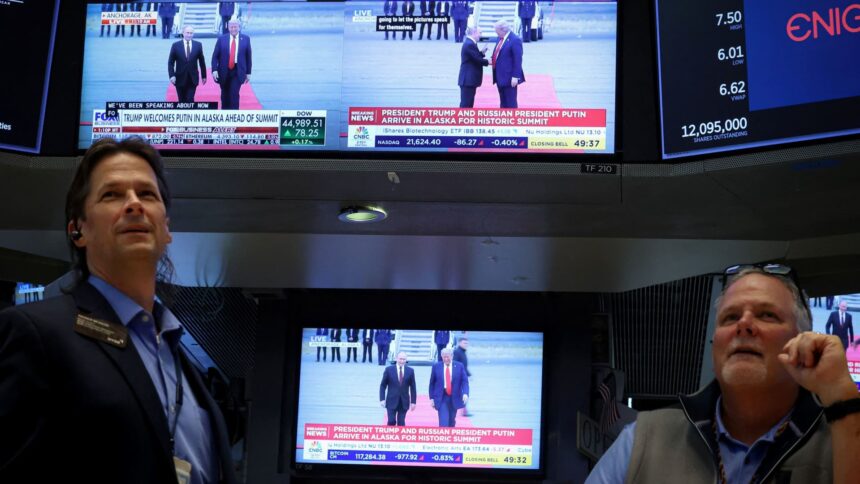Traders are closely monitoring geopolitical developments as U.S. President Donald Trump meets with Russian President Vladimir Putin at Joint Base Elmendorf-Richardson in Anchorage, Alaska. The focus of their negotiations is an effort to end the ongoing war in Ukraine, which has drawn international attention and raised concerns amongst investors.
In a turbulent trading session on Friday, U.S. stocks experienced significant declines following Trump’s assertion of a potential “massive increase of tariffs” on Chinese imports. This announcement came in response to China’s expansion of export restrictions on rare earth materials, which Trump labeled as a “hostile” act on social media. The three major stock indexes witnessed their poorest performance in several months, with the U.S. stock market losing an astounding $2 trillion in value, as analyzed by Bespoke Investment Group. The decline marked the end of a relatively calm period, with the CBOE Volatility Index — known as Wall Street’s “fear gauge” — spiking to heights not seen since June. The S&P 500 halted its impressive 33-day streak without a swing of at least 1% in either direction.
Adding to the market’s woes, Trump announced the implementation of 100% levies on imports from China and export controls on critical software, effective November 1. However, optimistic sentiments returned on Sunday when Trump stated that relations with China would stabilize, asserting that neither he nor Chinese President Xi Jinping would desire a depression for either nation.
In other financial news, JPMorgan Chase unveiled a new initiative aimed at securing stakes in companies deemed vital to U.S. interests and national security. The bank plans to allocate up to $10 billion into sectors like defense, aerospace, and energy technology. As part of this broader Security and Resiliency Initiative, JPMorgan intends to finance or facilitate a staggering $1.5 trillion in funding for essential companies. This announcement saw JPMorgan’s stock rise by 1.4% in premarket trading.
Domestically, the Trump administration has begun laying off federal workers due to a government shutdown that is nearing its third week, with no resolution in sight. Trump indicated that significant cuts to the federal workforce are imminent. Over the weekend, he claimed that funds had been identified to ensure military personnel would be paid if the shutdown extends to mid-October, when active duty service members are due for their next paychecks. Vice President JD Vance criticized the Affordable Care Act credits, labeling them as wasteful and expressing the administration’s intent to ensure that tax credits reach those genuinely in need.
Meanwhile, shifting retail landscapes show that while Gen Z might be shying away from department stores, baby boomers remain loyal shoppers. Data indicates that a significant portion of customers at Macy’s and Bloomingdale’s are older than 45, drawn in by in-store experiences like flexible return policies and promotional events. However, as retail experts observe, the generational gap may hinder younger consumers’ interest, with some stating, “I don’t want to shop where my mother shops.”
In a positive note from the toy industry, Lego reported that more than a million kids around the globe have used its toy MRI scanner sets to prepare for medical procedures. The company’s research reveals that 96% of healthcare professionals believe the two-year-old model has effectively reduced children’s anxiety levels prior to treatment, with nearly half of the surveyed professionals noting a decreased need for sedation after kids interacted with the miniature MRI set.
As we move into earnings season, investors are gearing up for a busy week ahead, even as economic releases may be delayed due to the ongoing government shutdown.







